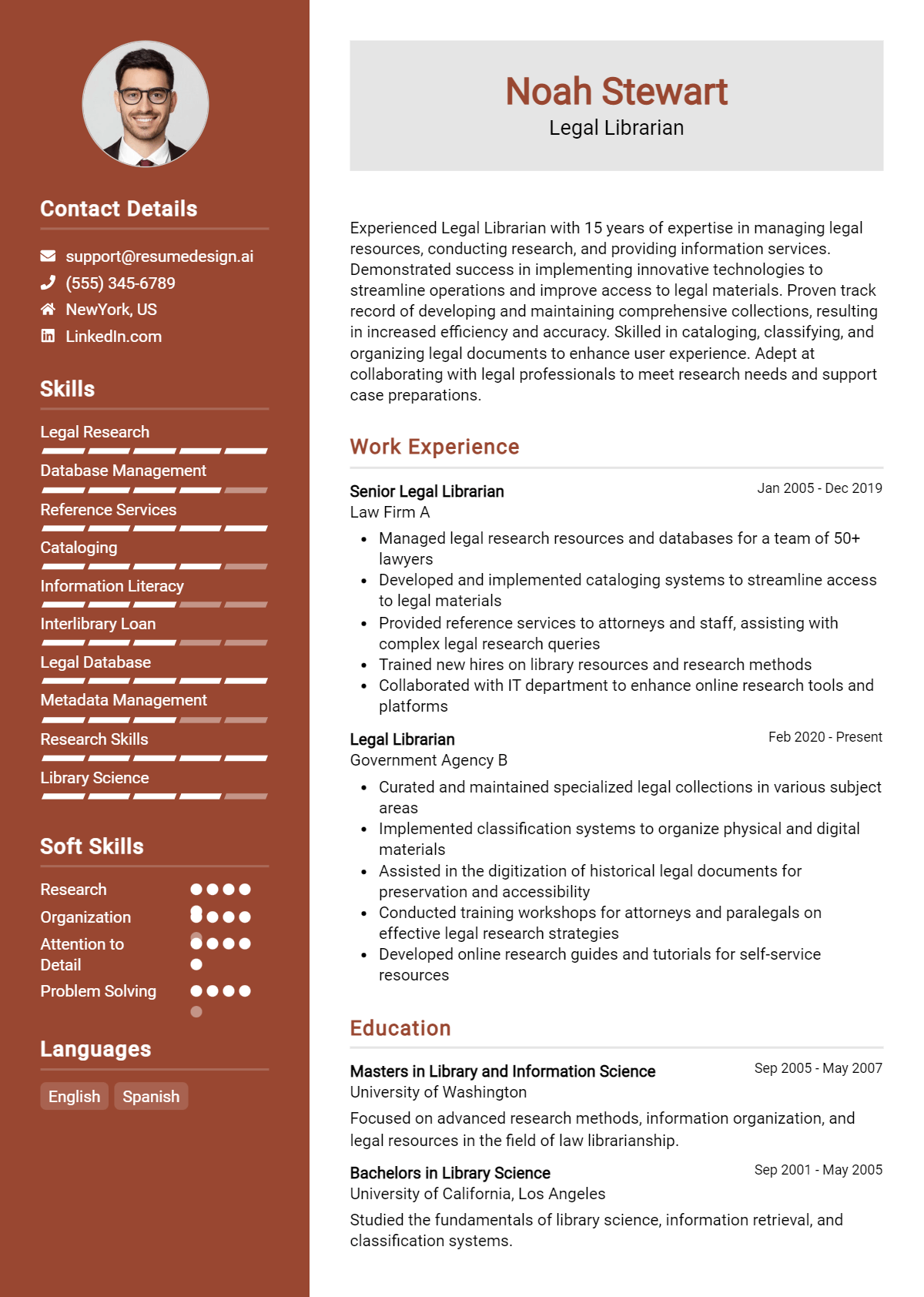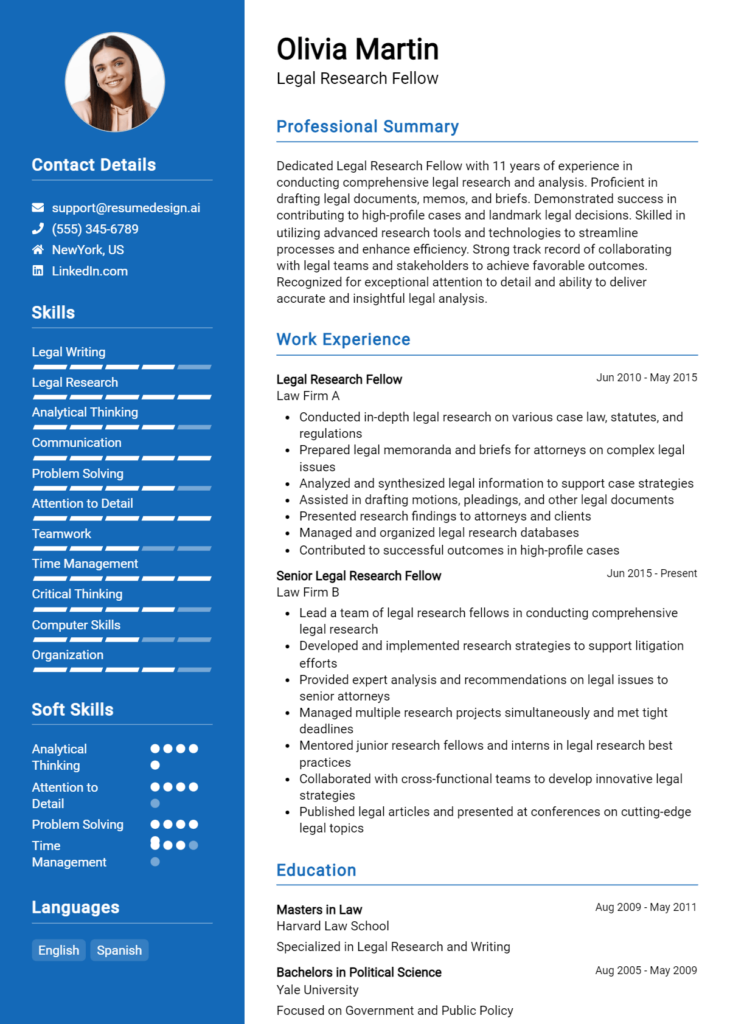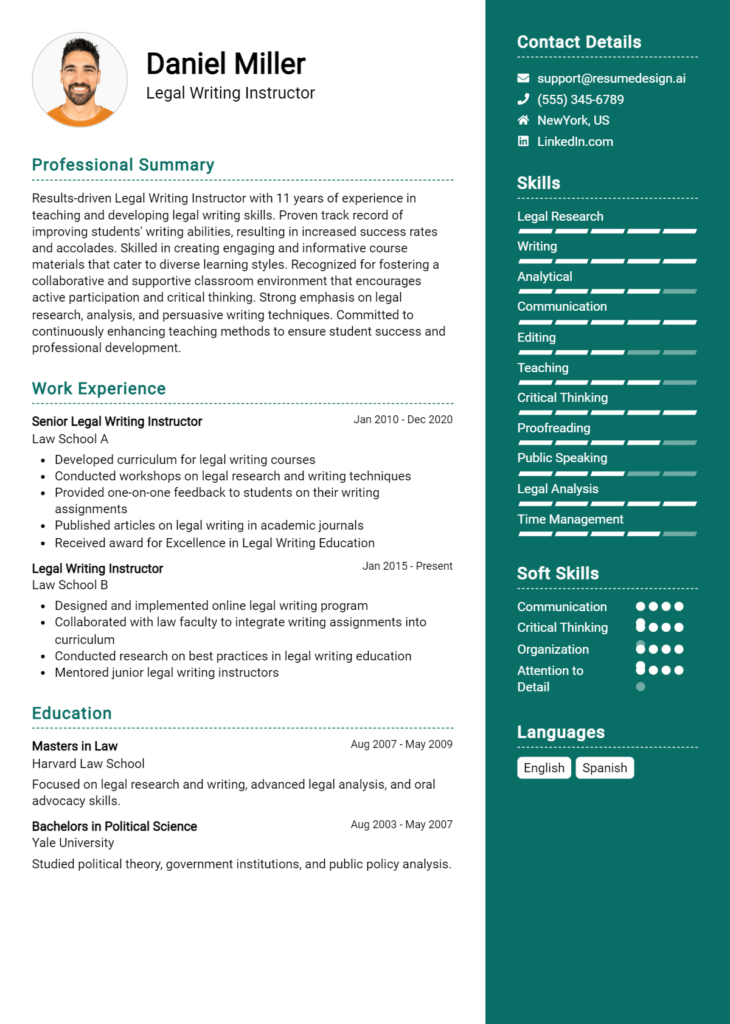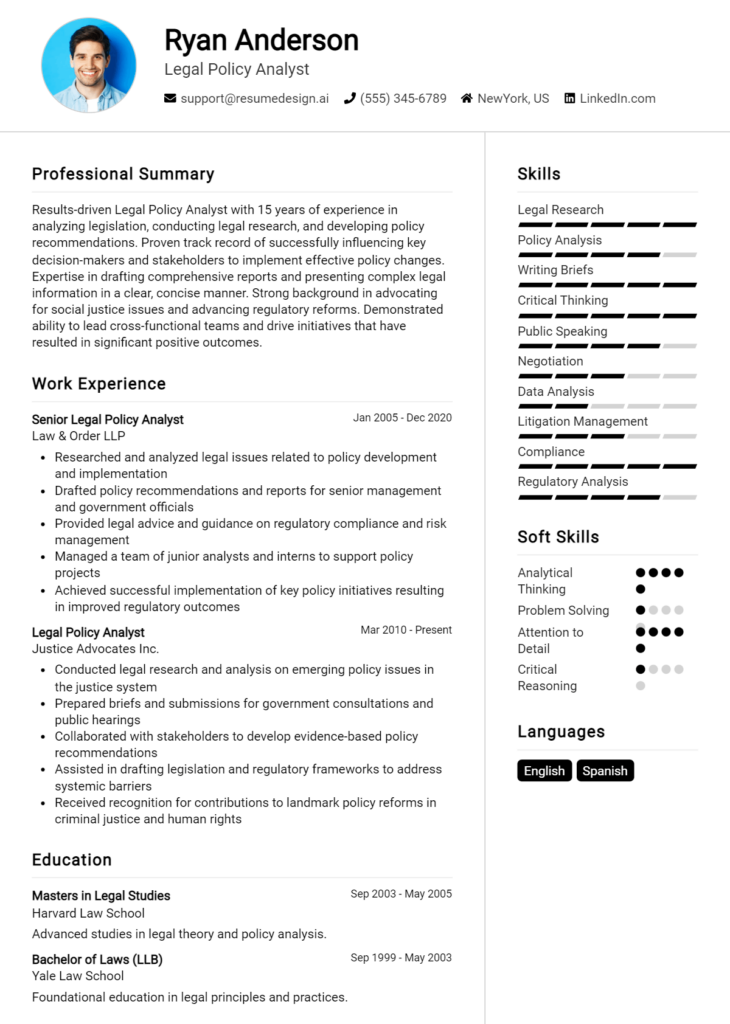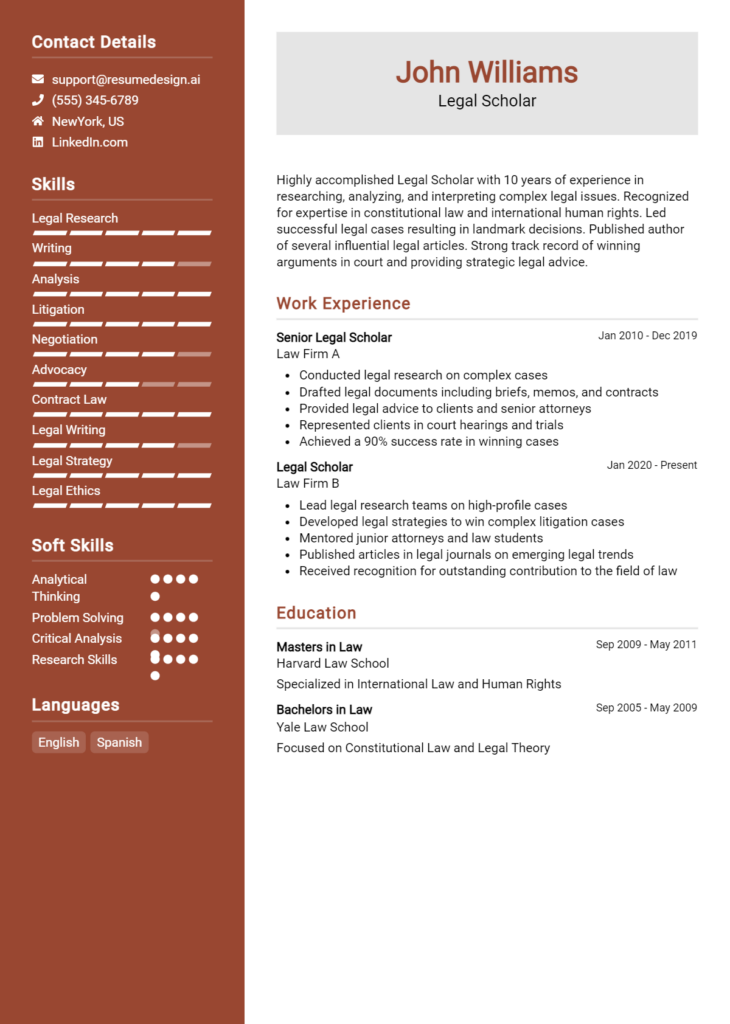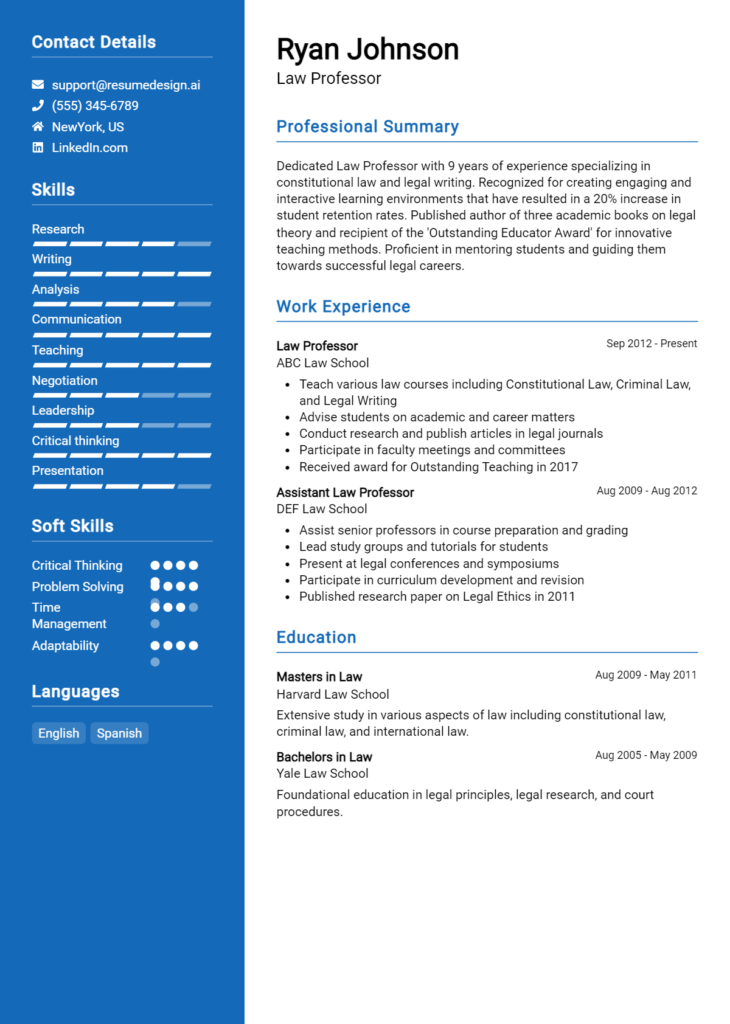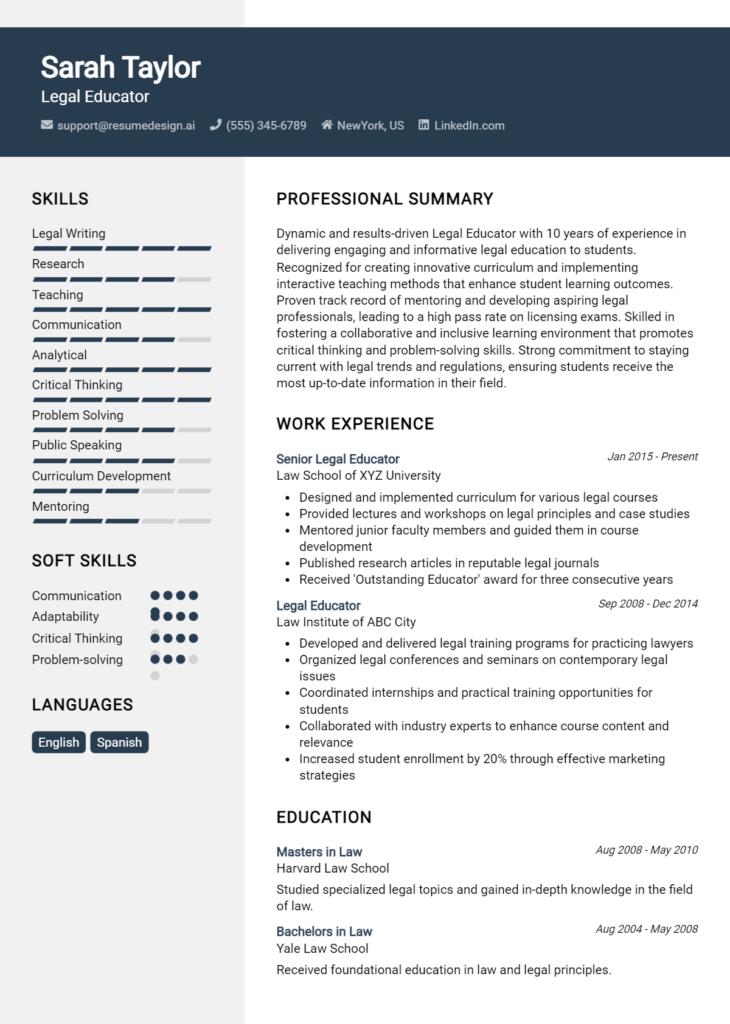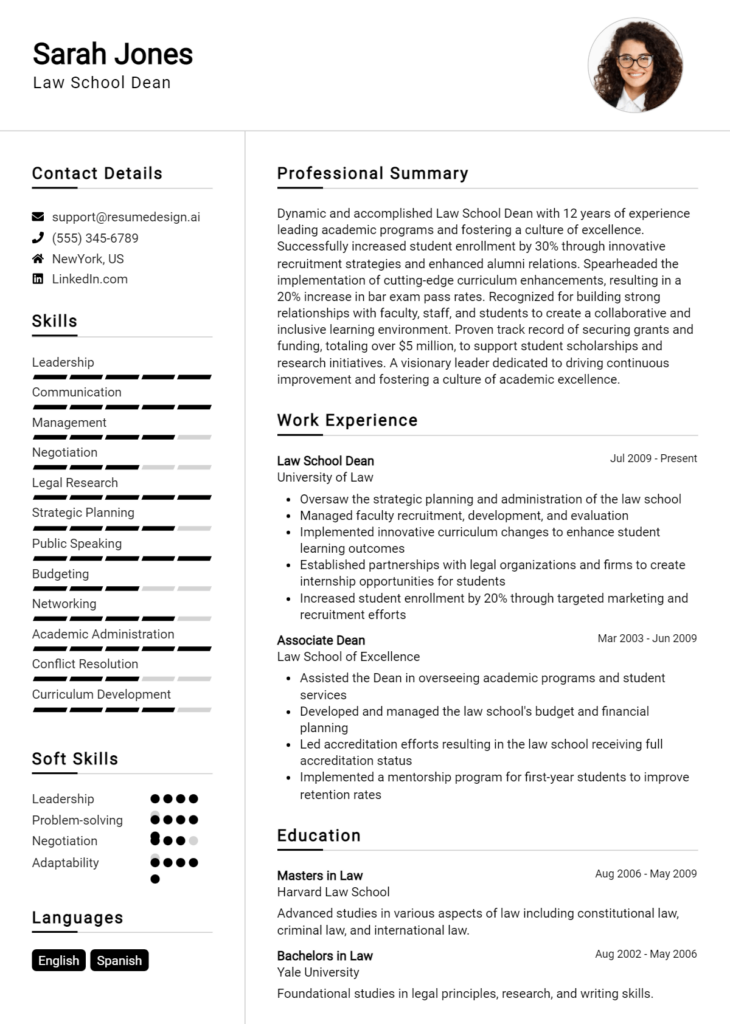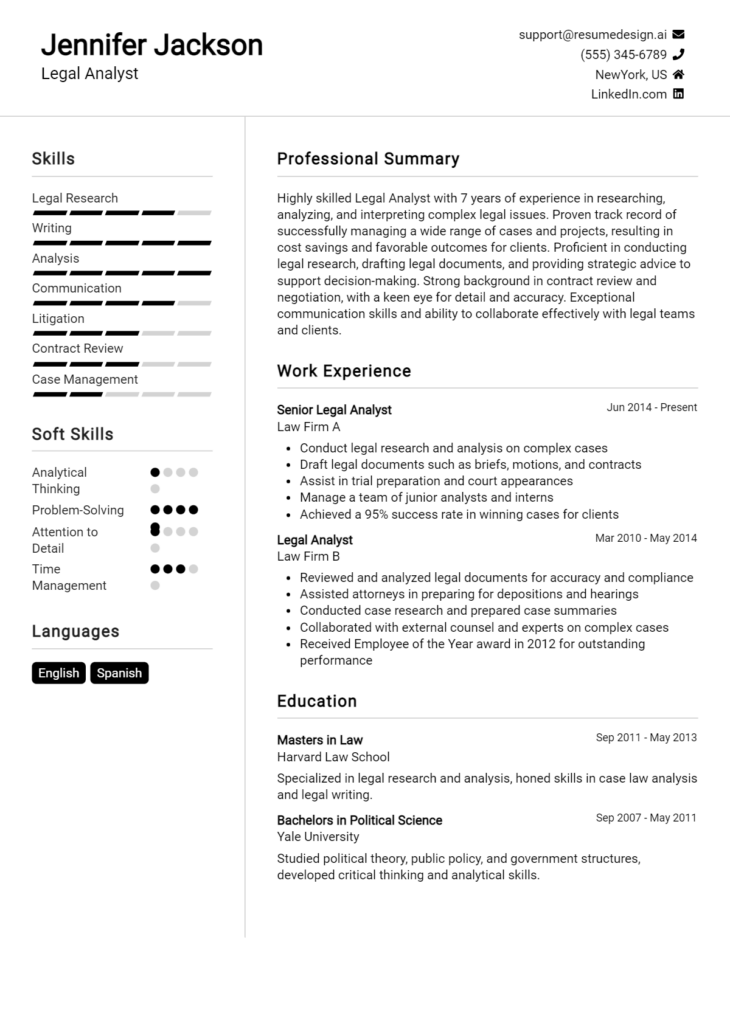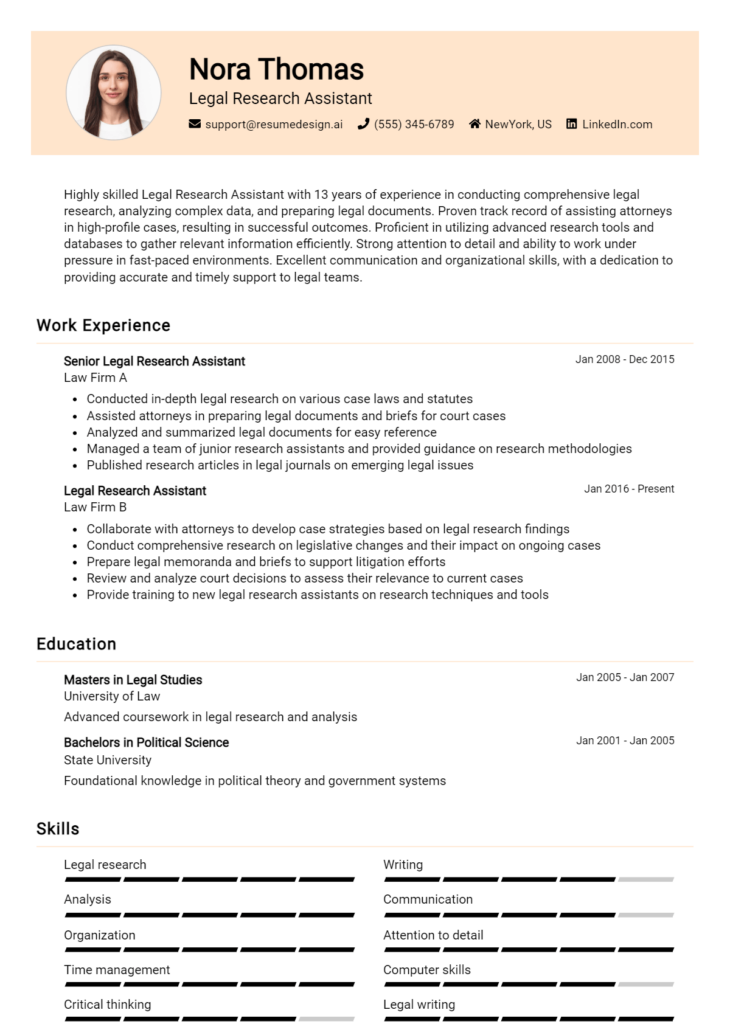Legal Librarian Core Responsibilities
A Legal Librarian plays a crucial role in facilitating access to legal resources and information across various departments, enhancing the operational efficiency of legal teams. Key responsibilities include managing legal collections, conducting research, and providing training on legal research methodologies. Essential skills encompass technical proficiency in legal databases, operational organization, and adept problem-solving abilities, which collectively contribute to the organization's strategic goals. A well-structured resume that highlights these qualifications can significantly enhance a candidate's appeal to potential employers.
Common Responsibilities Listed on Legal Librarian Resume
- Cataloging and maintaining legal materials and resources
- Conducting legal research and providing analytical support
- Assisting attorneys and staff in locating legal information
- Developing and implementing library policies and procedures
- Training staff on legal research tools and techniques
- Managing digital resources and electronic databases
- Coordinating interlibrary loans and resource sharing
- Staying current with legal publications and trends
- Providing reference services and answering inquiries
- Supporting compliance with legal research standards
- Collaborating with other departments to meet information needs
- Contributing to library budget planning and management
High-Level Resume Tips for Legal Librarian Professionals
In the competitive field of legal librarianship, a well-crafted resume is essential for making a strong first impression on potential employers. Your resume serves as a window into your professional capabilities, showcasing not only your skills but also your unique achievements and contributions to the legal information landscape. It is vital that your resume reflects your expertise in legal research, information management, and library science, as these elements are crucial to standing out among other candidates. In this guide, we will provide practical and actionable resume tips specifically tailored for Legal Librarian professionals, helping you to present your qualifications in the best possible light.
Top Resume Tips for Legal Librarian Professionals
- Tailor your resume to match the specific job description by using keywords and phrases from the posting.
- Highlight relevant experience in legal research, information retrieval, and library management to showcase your expertise.
- Quantify achievements when possible, such as the number of successful research projects completed or the size of collections managed.
- Include industry-specific skills such as proficiency in legal databases, citation management tools, and information literacy training.
- Showcase your ability to collaborate with legal professionals and support their research needs effectively.
- Incorporate any certifications or specialized training relevant to legal librarianship, such as an MLIS or experience with specific legal resources.
- Emphasize your understanding of legal terminology and concepts, showcasing your ability to navigate complex legal information.
- Utilize a clean, professional format that enhances readability and allows your accomplishments to stand out.
- Consider including a summary or objective statement at the top that clearly defines your career goals and what you bring to the table.
- Keep your resume concise, ideally one to two pages, ensuring that only the most relevant information is included.
By implementing these tips, you can significantly enhance your resume's effectiveness and increase your chances of landing a position in the Legal Librarian field. A well-structured and tailored resume not only communicates your qualifications but also demonstrates your professionalism and attention to detail—qualities that are highly valued in legal librarianship.
Why Resume Headlines & Titles are Important for Legal Librarian
In the competitive field of legal librarianship, a well-crafted resume headline or title is essential for capturing the attention of hiring managers. A strong headline serves as a concise summary of a candidate's key qualifications, allowing them to stand out in a crowded applicant pool. By using impactful phrases, legal librarians can immediately convey their expertise, specialization, and unique value proposition. This critical element of the resume must be relevant, succinct, and tailored to the specific job being applied for, ensuring that it resonates with the expectations of potential employers.
Best Practices for Crafting Resume Headlines for Legal Librarian
- Keep it concise: Aim for one impactful phrase that summarizes your qualifications.
- Be role-specific: Tailor your headline to reflect the specific job title you are applying for.
- Highlight key skills: Incorporate core competencies that align with the job description.
- Showcase experience: Mention years of experience or notable achievements directly related to legal librarianship.
- Use industry keywords: Include relevant terminology that resonates with hiring managers in the legal field.
- Make it impactful: Use action-oriented language to create a sense of urgency and importance.
- Avoid clichés: Steer clear of overused phrases that may dilute your message.
- Revise regularly: Update your headline for each job application to ensure maximum relevance.
Example Resume Headlines for Legal Librarian
Strong Resume Headlines
Expert Legal Librarian Specializing in Research and Information Management
Dynamic Legal Information Specialist with 10+ Years of Experience in Law Firm Support
Proven Track Record in Legal Research and Knowledge Management for Corporate Counsel
Innovative Legal Librarian Committed to Enhancing Access to Legal Resources
Weak Resume Headlines
Librarian Looking for a Job
Experienced Professional
Seeking Opportunities in the Legal Field
The strong headlines are effective because they are specific, clearly articulating the candidate's skills and experiences that are directly relevant to the role of a legal librarian. They immediately communicate value and expertise, making it easier for hiring managers to see why the candidate would be a good fit. In contrast, the weak headlines fail to impress due to their vagueness and lack of specificity. They do not provide any substantial information about the candidate's qualifications, leaving hiring managers with little motivation to delve further into the resume.
Writing an Exceptional Legal Librarian Resume Summary
A resume summary is a critical component for a Legal Librarian as it serves as the first impression a candidate makes on hiring managers. This brief introduction should quickly capture their attention by highlighting key skills, relevant experience, and notable accomplishments tailored to the specific job being applied for. A well-crafted summary not only showcases the candidate's qualifications but also conveys their passion for legal research and library services, making it essential for standing out in a competitive job market. It should be concise and impactful, allowing the candidate to effectively communicate their value at a glance.
Best Practices for Writing a Legal Librarian Resume Summary
- Quantify achievements: Use numbers and metrics to demonstrate your impact, such as the number of resources managed or improvements in research efficiency.
- Focus on relevant skills: Highlight key skills pertinent to the role, such as legal research, database management, and information literacy.
- Tailor the summary: Customize your summary for each job application to align with the specific job description and requirements.
- Use action verbs: Start sentences with strong action verbs to convey a sense of initiative and accomplishment.
- Keep it concise: Aim for 2-4 sentences that convey your core competencies without overwhelming the reader.
- Highlight legal knowledge: Emphasize your understanding of legal terminology and concepts, as well as any relevant degrees or certifications.
- Incorporate keywords: Include industry-specific keywords to improve your chances of passing through applicant tracking systems (ATS).
- Showcase collaboration: Mention your ability to work with legal professionals and other librarians to enhance the library's resources and services.
Example Legal Librarian Resume Summaries
Strong Resume Summaries
Dynamic Legal Librarian with over 7 years of experience in managing extensive legal databases and resources, resulting in a 30% increase in research efficiency for law firm clients. Proven expertise in legal research and information retrieval, complemented by a Master's in Library Science and a passion for supporting legal professionals.
Detail-oriented Legal Librarian with a track record of developing and implementing innovative research strategies that improved user engagement by 25%. Skilled in utilizing advanced legal research tools and databases, with a strong foundation in legal principles and practices.
Experienced Legal Librarian adept at curating and organizing legal resources, achieving a 40% reduction in information retrieval time for attorneys. Committed to continuous learning and collaboration, with a strong background in teaching legal research methodologies.
Weak Resume Summaries
I am a Legal Librarian with experience in libraries and a strong interest in legal research.
Knowledgeable in law and libraries, I have worked in various positions that involved research and information management.
The strong resume summaries are effective because they provide specific details about the candidate's achievements, quantify their impact, and highlight relevant skills tailored to the role of a Legal Librarian. In contrast, the weak summaries are vague and lack measurable outcomes, making them less compelling and memorable to hiring managers. By focusing on concrete contributions and specialized knowledge, the strong summaries clearly demonstrate the candidates' value in the legal library context.
Work Experience Section for Legal Librarian Resume
The work experience section of a Legal Librarian resume is critical as it provides a comprehensive overview of the candidate's professional background and technical capabilities. This section not only highlights the candidate's proficiency in legal research, information management, and library sciences but also emphasizes their ability to lead teams and deliver high-quality support to legal professionals. By quantifying achievements and aligning experiences with industry standards, candidates can effectively demonstrate their value to potential employers, making this section a pivotal element of the resume.
Best Practices for Legal Librarian Work Experience
- Focus on specific technical skills relevant to legal research and library management.
- Quantify achievements with metrics such as improved efficiency, user satisfaction ratings, or budget management.
- Highlight experiences that demonstrate leadership in managing library teams or projects.
- Showcase collaboration with legal professionals or other departments to enhance library services.
- Include relevant certifications or training that bolster technical expertise.
- Utilize action verbs to convey a strong sense of initiative and impact in previous roles.
- Align your experiences with current industry trends and standards in legal librarianship.
- Maintain clarity and conciseness to ensure that key information is easily digestible.
Example Work Experiences for Legal Librarian
Strong Experiences
- Led a team of 5 in the implementation of a new digital catalog system, resulting in a 40% increase in user engagement and a 25% reduction in retrieval times.
- Managed a budget of $150,000 for library resources and services, negotiating contracts that saved the firm 15% annually.
- Developed and presented training workshops for over 100 legal staff on effective legal research techniques, improving overall research efficiency by 30%.
- Collaborated with IT to enhance the library's online portal, increasing remote access usage by 50% within six months.
Weak Experiences
- Assisted in library operations and general tasks.
- Helped with organizing library materials sometimes.
- Participated in meetings related to library functions.
- Responsible for some aspects of legal research.
The examples of strong experiences stand out due to their specificity, quantifiable outcomes, and clear demonstration of leadership and collaboration. Each point provides concrete evidence of the candidate's impact, making it easy for potential employers to gauge their effectiveness. In contrast, the weak experiences lack detail and fail to convey significant contributions or measurable results, making them less compelling for hiring managers.
Education and Certifications Section for Legal Librarian Resume
The education and certifications section of a Legal Librarian resume is crucial as it showcases the candidate's academic foundation and specialized knowledge relevant to the field. This section not only highlights degrees and industry-recognized certifications but also reflects the candidate's commitment to continuous learning and professional development. By detailing relevant coursework and specialized training, candidates can significantly enhance their credibility and demonstrate alignment with the specific requirements of the job role, thereby making a compelling case for their qualifications in the competitive legal landscape.
Best Practices for Legal Librarian Education and Certifications
- Include relevant degrees in library science, law, or information management.
- Highlight industry-recognized certifications such as Certified Law Librarian (CLL) or Certified Information Professional (CIP).
- Detail coursework that is pertinent to legal research, database management, or information retrieval.
- Update the section regularly to reflect new certifications or training completed.
- Prioritize advanced degrees (e.g., Master's in Library Science) over undergraduate qualifications when applicable.
- Include any specialized training in legal technologies or digital resources.
- Consider listing memberships in professional organizations, as they can indicate a commitment to the field.
- Be concise yet thorough in descriptions to maintain the reader's attention.
Example Education and Certifications for Legal Librarian
Strong Examples
- Master of Library and Information Science (MLIS) from an ALA-accredited institution.
- Certified Law Librarian (CLL) through the American Association of Law Libraries.
- Coursework in Advanced Legal Research and Information Retrieval Techniques.
- Certification in Legal Technology from the National Association of Legal Assistants.
Weak Examples
- Bachelor's degree in English Literature with no legal relevance.
- Certification in Graphic Design unrelated to library or legal studies.
- Old certification in General Library Science obtained over a decade ago.
- Coursework in Marketing that does not pertain to legal research or information science.
The strong examples are considered effective because they directly align with the qualifications and skills necessary for a Legal Librarian, showcasing both academic rigor and professional commitment. In contrast, the weak examples highlight irrelevant educational backgrounds or outdated certifications that do not contribute to the candidate's qualifications for the role, potentially detracting from their overall appeal in a highly specialized job market.
Top Skills & Keywords for Legal Librarian Resume
A well-crafted resume is essential for any professional, particularly for a Legal Librarian, where the right skills can significantly enhance job prospects. Highlighting relevant skills not only showcases your qualifications but also reflects your understanding of the unique demands of legal research and information management. Both hard and soft skills play a crucial role in defining a candidate's ability to effectively support legal professionals, manage resources, and navigate complex information landscapes. By incorporating targeted skills into your resume, you can demonstrate your value to potential employers and improve your chances of securing interviews.
Top Hard & Soft Skills for Legal Librarian
Soft Skills
- Strong communication skills
- Attention to detail
- Organizational abilities
- Critical thinking
- Problem-solving skills
- Research proficiency
- Adaptability
- Team collaboration
- Time management
- Customer service orientation
Hard Skills
- Legal research techniques
- Familiarity with legal databases (e.g., Westlaw, LexisNexis)
- Knowledge of citation styles (e.g., Bluebook)
- Information retrieval systems
- Document management software
- Cataloging and classification
- Data analysis and reporting
- Metadata standards
- Library science principles
- Digital resource management
For more insights on enhancing your skills and effectively showcasing your work experience, explore the provided links to elevate your resume and career as a Legal Librarian.
Stand Out with a Winning Legal Librarian Cover Letter
I am writing to express my interest in the Legal Librarian position at [Company/Organization Name]. With a Master’s degree in Library Science and over five years of experience in legal research and information management, I possess a comprehensive understanding of the unique needs of legal professionals. My background has equipped me with the skills to effectively curate, manage, and disseminate legal resources, ensuring that attorneys and staff have access to the most relevant and up-to-date information to support their work.
In my previous role at [Previous Employer], I successfully implemented a digital archiving system that improved access to legal documents and resources, reducing retrieval time by over 30%. I am adept at utilizing various legal research databases, including Westlaw and LexisNexis, and have a solid grasp of legal citation formats. My commitment to continuous learning allows me to stay current with the latest developments in legal research methodologies and library technologies, which I believe is essential in a rapidly evolving field.
Collaboration is key in a legal environment, and I pride myself on my ability to work closely with attorneys, paralegals, and administrative staff. I have organized training sessions to enhance legal research skills among team members, fostering a culture of knowledge-sharing and professional development. My strong communication skills enable me to translate complex legal concepts into accessible information, ensuring that all staff members feel empowered to navigate legal resources effectively.
I am excited about the opportunity to contribute to [Company/Organization Name] as a Legal Librarian and am confident that my experience and passion for legal research would be an asset to your team. Thank you for considering my application. I look forward to the possibility of discussing how I can support your organization in providing exceptional legal services.
Common Mistakes to Avoid in a Legal Librarian Resume
When crafting a resume for a Legal Librarian position, it's essential to present your qualifications and experience clearly and effectively. However, many applicants make common mistakes that can hinder their chances of securing an interview. By being aware of these pitfalls, you can create a more impactful resume that showcases your skills and expertise in legal research and information management.
Neglecting to Tailor the Resume: Failing to customize your resume for the specific job can make it seem generic. Always align your skills and experiences with the job description to demonstrate your suitability.
Using Jargon Without Explanation: While legal terminology is important, overloading your resume with jargon can confuse hiring managers. Ensure that key terms are accompanied by explanations where necessary.
Ignoring Relevant Experience: Some candidates overlook non-traditional roles that provided relevant skills. Include all pertinent experience, even if it’s not directly in a legal library setting, such as research positions or internships.
Poor Formatting: A cluttered or overly complex format can make your resume difficult to read. Use clear headings, bullet points, and consistent fonts to enhance readability.
Overemphasizing Duties Instead of Achievements: Listing job duties without highlighting specific achievements can make your contributions seem less impactful. Focus on quantifiable results and accomplishments to illustrate your effectiveness.
Lack of Keywords: Many organizations use applicant tracking systems (ATS) to screen resumes. Failing to include relevant keywords from the job posting can result in your resume being overlooked.
Forgetting Soft Skills: While technical skills are crucial, soft skills like communication, problem-solving, and teamwork are equally important in a legal library environment. Ensure you highlight these qualities.
Neglecting Professional Development: Omitting continuing education or professional memberships can diminish your credibility. Include relevant certifications, courses, or workshops to show your commitment to the field.
Conclusion
As we've explored in this article, the role of a Legal Librarian is pivotal in ensuring that legal professionals have access to the necessary resources and information. Key responsibilities often include managing legal information databases, assisting with legal research, and providing guidance on legal documentation. A successful Legal Librarian combines strong organizational skills with a deep understanding of legal terminology and research methodologies.
In today's competitive job market, it's essential to present a polished and professional resume that highlights your unique qualifications and experiences. Take the time to review and refine your Legal Librarian resume to ensure it effectively showcases your skills and achievements.
To assist you in this process, consider utilizing resources such as resume templates, which can provide you with a professional layout and design. You can also explore the resume builder to create a customized resume efficiently. Don’t forget to check out resume examples for inspiration and to see how others in your field have successfully presented their qualifications. Additionally, a compelling cover letter can set you apart, so be sure to look at cover letter templates to craft an impactful introduction to your application.
Now is the time to take action: review your Legal Librarian resume and make use of the tools available to enhance your job application. Your next career opportunity could be just around the corner!

